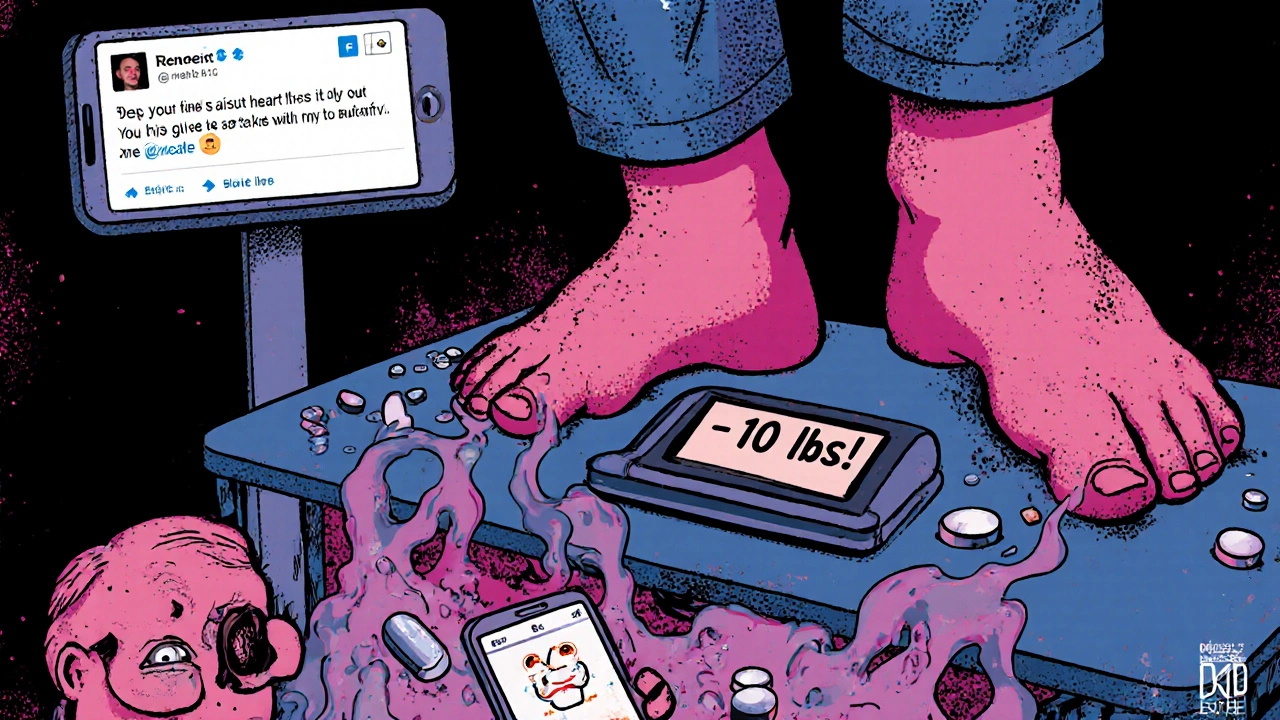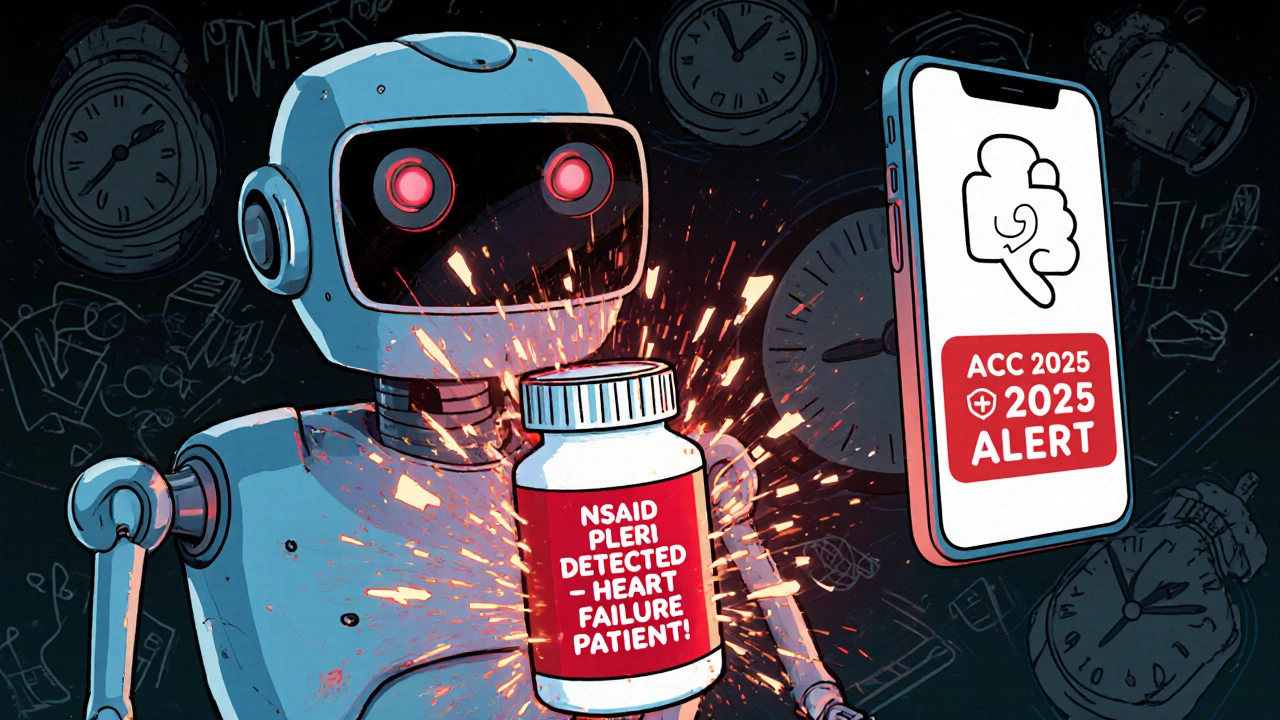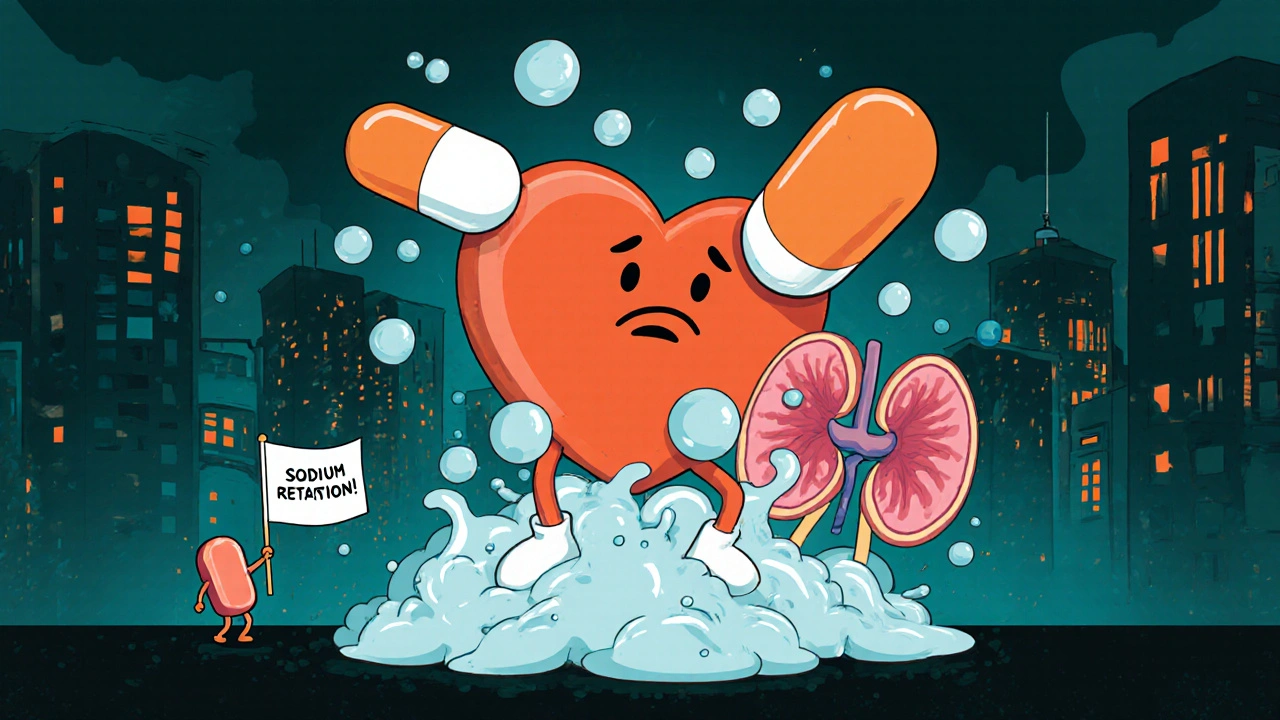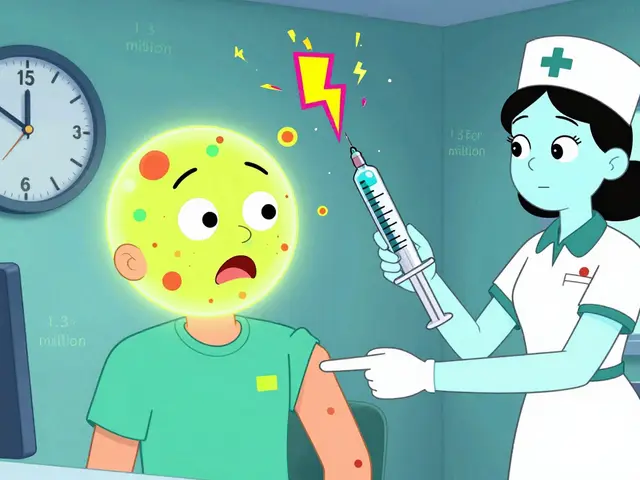Heart Failure NSAID Risk Assessment Tool
Your Risk Score:
Risk Level:
Key Findings:
Recommended Actions:
Every year, millions of people reach for ibuprofen or naproxen for a headache, sore knee, or back pain. But if you have heart failure, that simple pill could be pushing your body toward the emergency room. The link between common painkillers and worsening heart failure isn’t theoretical-it’s well-documented, life-threatening, and often overlooked.
How NSAIDs Trigger Fluid Buildup
NSAIDs-non-steroidal anti-inflammatory drugs-work by blocking enzymes called COX-1 and COX-2. These enzymes help make prostaglandins, chemicals that cause pain and swelling. But prostaglandins also play a quiet, vital role in your kidneys. They help keep blood flowing to them and signal the body to release excess salt and water. When NSAIDs shut down prostaglandin production, your kidneys don’t get the signal to flush out sodium. Instead, they hold onto it. And where sodium goes, water follows. This extra fluid piles up in your legs, lungs, and abdomen, making heart failure symptoms worse. The result? Swelling, sudden weight gain, and shortness of breath-even if you’ve been managing your condition well. In some cases, this happens within 24 to 72 hours of taking just one or two doses of an over-the-counter NSAID.Who’s at the Highest Risk?
Not everyone with heart failure reacts the same way. But certain groups are far more vulnerable:- People over 65
- Those with type 2 diabetes
- Patients with reduced kidney function
- Anyone already on diuretics or blood pressure meds like ACE inhibitors
All NSAIDs Carry the Same Risk-Even the "Safer" Ones
For years, people believed COX-2 inhibitors like celecoxib (Celebrex) were safer for the heart. That turned out to be a myth. The same 2003 review by Bleumink et al. showed that selective NSAIDs affect the kidneys just like traditional ones. They cause the same sodium retention, the same drop in kidney blood flow, and the same risk of fluid overload. In fact, the New Zealand Medsafe agency explicitly warned in 2019 that COX-2 inhibitors are not safer for heart failure patients. Even naproxen, sometimes thought to have a slightly better safety profile, still carries measurable risk. A meta-analysis found its relative risk for heart failure hospitalization was 0.92-almost the same as others. No NSAID is truly safe for someone with heart failure.
Real Stories, Real Consequences
Clinical data is one thing. Real-life experiences are another. A Reddit user in the r/heartfailure community described gaining 10 pounds of fluid in just three days after taking two 400mg ibuprofen tablets for a bad back. Another patient, interviewed by the American Heart Association, said she didn’t realize her daily Aleve was causing her ankles to swell until she was admitted for fluid overload. A 2018 survey found that 37% of heart failure patients had taken NSAIDs without knowing the risk. Of those, 62% ended up needing urgent medical care. Many didn’t think over-the-counter drugs counted as "medications"-until they ended up in the hospital.What Should You Take Instead?
Acetaminophen (Tylenol) is the most commonly recommended alternative. It doesn’t affect kidney prostaglandins the way NSAIDs do, so it doesn’t cause fluid retention. But here’s the catch: acetaminophen doesn’t reduce inflammation. It only eases pain and fever. So if you’re dealing with arthritis or a swollen joint, it won’t fix the root cause. That’s why doctors often recommend non-drug options:- Ice packs or heat therapy for joint pain
- Physical therapy to improve mobility
- Topical pain relievers like capsaicin cream or lidocaine patches
- Low-dose antidepressants (like duloxetine) for chronic nerve-related pain

Why Do Doctors Still Prescribe Them?
Despite clear guidelines, NSAIDs are still being handed out. A 2020 study found that nearly 16% of heart failure patients received an NSAID prescription within a year of diagnosis. That number jumps to over 22% in patients with preserved ejection fraction-a group often mistakenly thought to be "less sick." Why? Because pain is real. And many doctors don’t have time to dig into medication histories during a 10-minute visit. Patients don’t always mention OTC use. Pharmacists don’t always flag it. And many patients simply don’t know. The FDA required stronger warnings on NSAID labels in 2020, and the EMA did the same years earlier. But warnings on a bottle don’t change behavior if no one explains them.What You Can Do Today
If you have heart failure:- Check every medicine you take-even "natural" or "herbal" products. Some contain NSAID-like compounds.
- Never take ibuprofen, naproxen, diclofenac, or celecoxib without talking to your cardiologist first.
- Keep a daily weight log. A gain of 2 pounds or more in 24 hours could mean fluid retention.
- Ask your pharmacist to review all your medications at least twice a year.
- Teach family members to recognize warning signs: swollen ankles, trouble breathing while lying flat, sudden fatigue.
What’s Changing in 2025?
The American College of Cardiology is launching a mobile app in mid-2025 designed to alert heart failure patients when they try to purchase or scan an NSAID at the pharmacy. It will flag risks in real time and suggest safer alternatives. Meanwhile, the PRECISION-ABPM trial is testing whether ultra-low doses or timed NSAID use could reduce risk. But early results from September 2024 suggest even minimal use still triggers fluid retention in vulnerable patients. The message is clear: there’s no safe way to use NSAIDs if you have heart failure. Avoiding them isn’t a suggestion-it’s a survival strategy.Can I take ibuprofen if I have mild heart failure?
No. Even mild heart failure means your heart is struggling to manage fluid. Ibuprofen and other NSAIDs cause your kidneys to hold onto sodium and water, which increases pressure on your heart. This can trigger sudden worsening, even if you’ve felt stable. The risk isn’t about severity-it’s about physiology. All stages of heart failure carry this risk.
Is naproxen safer than ibuprofen for heart failure patients?
Some studies suggest naproxen has a slightly lower relative risk compared to other NSAIDs, but it still increases fluid retention and hospitalization risk. The difference is small-not enough to call it "safe." The European Society of Cardiology and American Heart Association advise avoiding all NSAIDs, including naproxen, in heart failure patients.
Can I use topical NSAIDs like Voltaren gel instead?
Topical NSAIDs are absorbed into the bloodstream in much smaller amounts, so they’re generally considered lower risk. But they’re not risk-free. A small amount still enters circulation and can affect kidney function, especially in older adults or those with reduced kidney health. Use them only under your doctor’s guidance and avoid applying them over large areas or for long periods.
How quickly can NSAIDs cause fluid retention?
Fluid retention can begin within 24 hours. Weight gain of 2-5 pounds in 2-3 days is a common early sign. Swelling in the ankles, shortness of breath, or needing more pillows to sleep are red flags. If you’ve taken an NSAID and notice these symptoms, contact your doctor immediately.
Why don’t more doctors warn patients about NSAIDs?
Many doctors assume patients know not to take NSAIDs, or they don’t ask about over-the-counter use during visits. A 2021 survey found only 43% of primary care doctors routinely check for NSAID use in heart failure patients. Patients often don’t think of Tylenol or Advil as "medications" worth mentioning. This gap in communication puts lives at risk.
What should I do if I accidentally took an NSAID?
If you’ve taken one dose and feel fine, monitor your weight and symptoms closely over the next 72 hours. If you gain more than 2 pounds, notice swelling, or feel more short of breath, call your doctor or go to urgent care. Don’t wait for symptoms to get worse. Early intervention can prevent hospitalization.
Are there any NSAIDs approved for heart failure patients?
No. No NSAID is approved or considered safe for heart failure patients. Guidelines from the European Society of Cardiology, American Heart Association, and U.S. FDA all state that NSAIDs should be avoided entirely. Even in rare cases where a doctor considers them, it’s only after exhausting all other options and with strict monitoring.







Comments
Jessica Healey
November 17, 2025 AT 11:02 AMI took ibuprofen for my knee last week and woke up looking like a balloon animal. My socks left imprints. My doctor nearly had a heart attack. I didn’t even think it counted as a "medication." Now I keep a list of everything I touch. RIP Advil.
Levi Hobbs
November 17, 2025 AT 13:54 PMIt's absolutely critical to understand that NSAIDs don't just "cause fluid retention"-they disrupt the renin-angiotensin-aldosterone system, reduce glomerular filtration rate, and impair natriuresis-all of which are already compromised in heart failure. This isn't a "side effect"; it's a physiological cascade that can kill. And yet, pharmacies still sell them like candy. We need better labeling, better education, and better enforcement.
henry mariono
November 18, 2025 AT 22:16 PMI read this article and just sat there. My mom had HF and took naproxen for years. She never knew. I wish someone had told us. I’m not mad. Just… heartbroken. Thanks for writing this.
Gordon Mcdonough
November 19, 2025 AT 18:23 PMWhy do we even have to worry about this? The government and big pharma are in bed together. They want you sick so you keep buying drugs. Tylenol is just as bad but they call it "safe" because it's cheaper to make. NSAIDs? They're trying to kill us slowly. Wake up people! This is a controlled population tactic. You think your doctor cares? He gets a kickback from the pharmacy!
Sridhar Suvarna
November 20, 2025 AT 17:20 PMIn India, many elderly take painkillers without prescription. My grandfather used to take diclofenac for back pain. He didn't know what HF was. He thought painkillers were like aspirin. This article should be translated into Hindi, Tamil, Bengali. Lives depend on awareness. Thank you for sharing.
Joseph Peel
November 22, 2025 AT 07:06 AMThe disconnect between medical guidelines and real-world behavior is staggering. A 2021 study in JAMA Internal Medicine showed that 68% of heart failure patients could not correctly identify which OTC drugs were dangerous. That’s not ignorance-it’s systemic failure. We need mandatory pharmacist counseling, not just labels. The FDA’s warning is a Band-Aid on a hemorrhage.
Kelsey Robertson
November 23, 2025 AT 16:06 PMLet me be the first to say this: acetaminophen is a silent killer too. It’s hepatotoxic. It’s neurotoxic. It’s the drug of choice for people who want to quietly self-destruct. And now we’re supposed to trade one poison for another? What a joke. The real solution? Stop treating symptoms. Start treating the root cause. Which is… stress. And capitalism. And the fact that we’re all just meat sacks trying to survive in a machine that doesn’t care.
Joseph Townsend
November 23, 2025 AT 19:06 PMI went from walking my dog daily to needing a walker in 72 hours after one bottle of Aleve. I thought I was being smart-"I’m not taking pills for a headache, I’m taking them for my arthritis!" Turns out my arthritis was just screaming at me to stop. Now I ice my knees, stretch like a yoga zombie, and cry into my chamomile tea. Pain is temporary? Nah. Shame and regret? That’s forever.
Bill Machi
November 25, 2025 AT 04:33 AMLet’s be honest: most people don’t care. They want relief. They don’t want to read 10 pages of medical jargon. They want a pill. And if a pill is on the shelf, they’ll buy it. This isn’t about education-it’s about human nature. You can’t fix stupid. You can only warn. And even then, most people will ignore it until they’re on a ventilator.
Elia DOnald Maluleke
November 25, 2025 AT 18:02 PMThere is a deep philosophical truth here: we have outsourced our pain to chemistry. We no longer endure-we eliminate. But the body remembers. The kidneys, the heart, the lungs-they are not machines to be overridden. They are ancient systems, evolved over millennia, and when we tamper with them, we do so at our peril. This is not just a medical issue-it is a spiritual one. We have forgotten how to suffer with dignity.
satya pradeep
November 27, 2025 AT 12:24 PMmy cousin in delhi got hospitalized after taking combiflam for 3 days. he thought it was just painkiller. no one told him. this is huge. we need to spread this info. also, if you have hf, try turmeric paste + massage. it helps a lot. not as fast as ibuprofen but safer. and ask your doc about gabapentin for nerve pain.
Prem Hungry
November 28, 2025 AT 12:59 PMHey friend, I know this is scary-but you’re not alone. I’ve been living with HF for 7 years. I used to take naproxen like candy. Now I use heat wraps, walk slowly, and talk to my physio twice a week. It’s not perfect-but I’m alive. You can do this. One day at a time. You got this. And if you need someone to talk to, I’m here. No judgment. Just support.
Leslie Douglas-Churchwell
November 28, 2025 AT 20:40 PMTHEY’RE LYING TO YOU AGAIN. NSAIDs? Just the tip of the iceberg. Did you know the FDA approved celecoxib despite knowing it caused 100,000+ GI bleeds? And now they’re pushing this "app" in 2025? It’s a distraction. The real agenda? To make you dependent on their digital surveillance ecosystem. Your pharmacy scan data? Sold to insurers. Your weight gain? Used to raise your premiums. This isn’t healthcare. It’s data harvesting with a side of placebo safety.